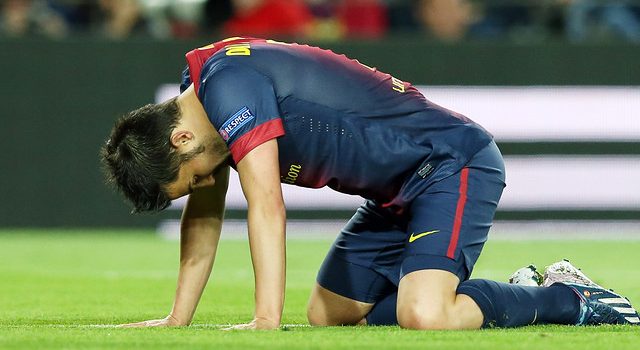When Rijkaard left his post as Barcelona manager in 2008, the recruitment of Guardiola brought glory days to the Catalan club which will live long in the memory.
On Wednesday night, all football fans from around the globe witnessed one of the most outstanding results in the past four seasons. Bavarian giants Bayern Munich had not only outclassed and outplayed their opponents but they did so in humiliating fashion, beating them with an aggregate score of 7-0.
In this article O-Posts’ Ahmed Assem examines the downfall of the Catalan giants.
The Transfer Policy
Even during Guardiola’s tenure at the club, the Spanish giants’ transfer policy had been anything but shrewd. After the new manager had announced the departures of Deco, Ronaldinho and the retirement of Thuram amongst others, he signed seven players.
Those players were Seydou Keita, Pique, Pinto, Caceres, Dani Alves, Hleb and Henrique. Out of those seven only three had a major impact.
Pinto is a back-up keeper and was initially signed as a back-up keeper, and shouldn’t be regarded as a player who was a major force behind the success of the team. Caceres was signed for €16.5m and only amassed thirteen caps for Barcelona between 2008-2011.
When Eric Abidal was ruled out of the 2009 Champions League Final through suspension, Guardiola opted for Sylvinho instead which just shows that he didn’t have faith in the Uruguayan and that a 34-year old full back was above him in the pecking order.
Hleb was signed from Arsenal with very high expectations from the Barcelona faithful, yet the Belarusian didn’t live up to those expectations and when called upon he was often erratic. Henrique however, was a signing who never lived up to his potential and he never made a single official cap for Barcelona.
In the following season, two signings caught the headlines. Ukrainian defender Dymtro Chygrynskiy was signed from UEFA Cup champions and Ukrainian powerhouses Shakhtar Donetsk, he signed for €25m and again proved to be another unsuccessful signing. He made just twelve appearances for Barcelona, and was sold in the following summer for €15m.
Zlatan Ibrahimovic was signed for €66m, the third highest fee payed ever for a player. The Swede’s time was all about controversy, one of the few high points is the goal against Pellegrini’s Real Madrid.
2011/12 proved very successful for Barcelona as they won the Champions League and the La Liga. The acquisition of David Villa was decent, and the Spaniard added that energy to the dynamic attacking third. Adriano was signed from Sevilla, and the former Sevilla man can be inconsistent at times but he is ‘not bad’.
Lastly, Javier Mascherano was an interesting one, where will he play? To this day Mascherano is played out of position as a centre-back due to the defensive problems at Barcelona.
11/12 and 12/13 saw four big name signings arrive at the Camp Nou, and ironically the cheapest proved to be the most ‘vital’. Two of those four were Cesc Fabregas for a mammoth price of €40m and Alexis Sanchez for €26m. Did they live up to expectations? No - even the stats at www.footballscores.com can attest to that. Alex Song was the last player recruited, from North London giants Arsenal. The Cameroonian, albeit promising, was torrid.
From the first day, any Premier League follower would know that Song doesn’t quite provide that protection in front of the back four.
Outdated Tactics
When Guardiola first implemented the tiki-taka, it was a worldwide wonder. Everyone was talking about it, but now? It is becoming rather mind-numbing to watch them play, it is like they are obsessed with possession. One reason for that is lacking a target man.
Messi, never was and never will be a target man or a striker, simple. The Argentine is being used as a striker, yet he doesn’t have the physical presence and the attributes and that is a major reason why Barcelona have succumbed to several defeats this season in the Champions League.
Remember that man Samuel Eto’o? Whenever Barcelona were struggling to break a Catenaccio type defence or a condensed midfield they could drop it in to Eto’o. The Cameroonian would then re-distribute play and by moving into effective positions, he creates that hole in the back-line.
When Ibrahimovic was signed, he did arguably the same role, for example remember that goal against Real Madrid? It was from a Dani Alves cross, or the goal against Racing Santander. After the falling out with Pep, Barcelona were left with a static front line who couldn’t break down Mourinho’s Inter, which caused them to bow out of the Champions League.
When David Villa arrived, he didn’t quite play as the main ‘striker’ like the previous two. David Villa’s role was transforming a static attack to a very dynamic one. The former Valencia man, used to switch with either Pedro or Messi, allowing them to find a soft-spot in defence. It was like a virus, very hard to stop.
Their movements would often mean Xavi finding a gap in defence in providing that clinical through pass in which any forward player would notch onto it. The opponent’s defensive line would think its offside, therefore they wouldn’t move to stop the attacking player.
Nowadays, we don’t find that as teams know how to play against them. Due to their short statures they know they are not going to expect a cross. Therefore, teams implement Sacchi’s ideology, ‘compact defending’. The defensive line would be very tight and in front of them, providing a screen, a very condensed midfield. This will limit the effectiveness of Barcelona as they are not going to score from wide positions.
If that continues, the ‘Dream Team’ will no longer be the side they used to be. Let’s not forget that arrogance is what cost Rijkaard his job.
Written by Ahmed Assem
Follow Ahmed on Twitter @AhmedAssem97
Please like O-Posts on Facebook
You can follow O-Posts on Twitter @OPosts

